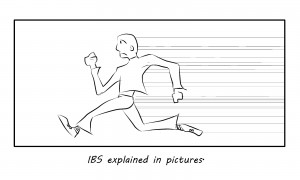 You’ve already been to the bathroom 12 times today. That’s not a joke, it’s a literal count of the times you’ve had to go and use the restroom. If you had a stomach virus, or maybe a bug you caught at work or school, that would seem normal. But for you, it’s just another day. If this is you and the life you’re living right now, it’s possibly time to get treatment for IBS.
You’ve already been to the bathroom 12 times today. That’s not a joke, it’s a literal count of the times you’ve had to go and use the restroom. If you had a stomach virus, or maybe a bug you caught at work or school, that would seem normal. But for you, it’s just another day. If this is you and the life you’re living right now, it’s possibly time to get treatment for IBS.
Treatment for IBS: What’s IBS?
IBS is the acronym for Irritable Bowel Syndrome, a chronic (long term) illness that is diagnosed only through a long series of elimination tests. Once you find that you don’t have something else, you answer a few specific questions, and if the response is yes to some or all of these questions, you will be diagnosed and given treatment for IBS. Symptoms of IBS include, but are not limited to:
- Abnormally Frequent, or Abnormally Infrequent Bowel Movements
- Persistent Alternating Forms of Defecation, pooping (called IBS-A)
- Persistent Diarrhea (called IBS-D)
- Persistent Constipation (called IBS-C)
- Unexplained Weight Loss
- High Levels of Stress
Many people have experienced these problems at one time or another, that does not mean they have Irritable Bowel Syndrome. IBS is persistent. It lasts and doesn’t go away on its own. The symptoms often cause a serious disruption in the life of those with the illness, which doesn’t get better without treatment for
IBS.
Treatment for IBS: Treatment Options
Getting treatment for this conditionmight be a bit of a misnomer in that, even though it does not shorten life span, there is no known cure for the illness. Perhaps a better way to describe the treatment for IBSis
to say that you manage it. There are several options for management of the symptoms:
- Medications
- Laxatives
- Diet
- High Fiber Intake
- Probiotics
- Exercise
- Psychotherapy
Each of these control measures is currently being used in treatment for IBS. As always, consult your physician and/or registered dietician before employing any new treatment for an illness.
Medication – There are a multitude of medicines currently being used to treat sufferers of IBS, including but not limited to:
- Laxatives
- Antispasmodics
- Neuro & Musculotropics
- Serotonin Adjusters
There is some evidence that each of these drugs has a positive effect on the symptoms, and are currently used in treatment for IBS.
Laxatives – These are drugs, but have been separated for our purposes here, because:
- There is such a wide variety to choose from
- Many are “over the counter”
As long as they are physician recommended for IBS, then personal preference and efficacy should be the criteria for usage of a laxative.
Diet and High Fiber Intake – Diet is the Best Treatment for IBS that has been discovered so far. It has the best chance of controlling the symptoms that make an IBS life sometimes unbearable. There are several things to consider, and do, in order to make your IBS diet successful.
- Journal for an extended period of time so you can observe patterns of change and improvements in your bowel movements.
- Increase your fiber intake to the recommended levels.
- Avoid caffeine
- Avoid dairy products (lactose intolerance is usually an issue)
- Avoid certain sugars and carbohydrates (see FODMAP section)
- Avoid alcohol
FODMAP Diet – What is FODMAP? It’s more of a list rather than a diet. It tells you the foods that you should avoid in order to reduce the gastric stress level. It also gives you foods that have been shown to have little or no ill effects on your bowel habits.
Probiotics – One of the Natural Treatments for IBS is Probiotics. Simply put probiotics are good bacteria. The supplements usually come in:
- Pill
- Powder
- Liquid
Form, and add healthy bacteria to the gastrointestinal tract while decreasing harmful bacteria. Make sure and consult a dietician before using probiotics.
Psychotherapy and Relaxation –This is a touchy area for some, as many people hear the word “psych” and immediately attach a preconception to it. That’s just not a correct interpretation of the situation. With such a high degree of stress in the life of someone seeking treatment for IBS, patients need support; professional support. IBSers are not crazy or “just freakin’ out,” they are in crisis. Here are some common therapies:
- Exercise
- Cognitive/Behavioral Therapy
- Yoga
- Acupuncture
- Support Groups
Treatment for IBS: Final Thoughts
If you suffer from IBS, remember one very important thing, you are NOT alone! There are perhaps millions of IBSers out there and you can find treatment for IBS if you look. So don’t lose heart, but instead, seek out help. It’s only with information and support that your treatment for IBS will be successful.
Which is NOT a symptom of IBS?
a. Persistent Constipation
b. Abdominal Cramping and Pain
c. Unexplained Weight Loss
d. Aching Joint and Muscles
True or False: Seeking psychotherapy is a good idea for the sufferers of IBS?
a. True
b. False
Which is NOT a treatment option for IBS?
a. Low Fiber Diet
b. Probiotics
c. IBS Diet Plan
d. Exercise and Stress Reduction Therapy
Answers at the bottom of the page!

Irritable Bowel Syndrome – Secrets
This handy and useful eBook is chalk full of information about Irritable Bowel Syndrome. It covers a wide range of topics, and provides hints on how to deal with some of the stickier issues relating to IBS. It covers many of the possible causes and what might be contributing to your symptoms. It also gives many 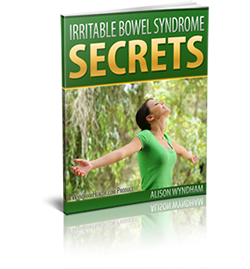 hints at how to better manage your symptoms.
hints at how to better manage your symptoms.
Thoughts
No one said IBS was going to be an easy fix; it isn’t. There are however things you can do to help yourself, and what Alison Wyndham has done is collect a multitude of those helpful hints and remedies in one place. With practical and handy guides on diet, medications, and staying mentally tough, this eBook “hits the spot” when it comes to dealing with IBS.
IBS—Free at Last!
The new FODMAP diet described in this book allows the sufferer of IBS to break free of traditional bland 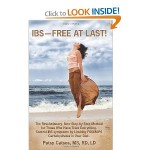 high fiber diets. With a new look at all the foods which aid in IBS symptom relief, this book provides a newer, brighter dieting future.
high fiber diets. With a new look at all the foods which aid in IBS symptom relief, this book provides a newer, brighter dieting future.
Thoughts
Dieting is hard enough without having to add medical restrictions. For the sufferers of Irritable Bowel Syndrome (IBS,) this is doubly so. High in fiber and bland as it gets, traditional IBS diet law says you have to keep it boring. Well, IBS-Free At Last is a rebel book with a definite cause. Author Patsy Catsos in this tome, has created a new way of eating for IBS. Still healthy and symptom relieving, the foods in this IBS diet will excite, rather than bore the dieter.
Eating for IBS
In this excellent recipe book, specifically designed for IBS treatment, Heather Van Vorous has compiled 175 recipes for an IBS diet. Vorous subscribes to 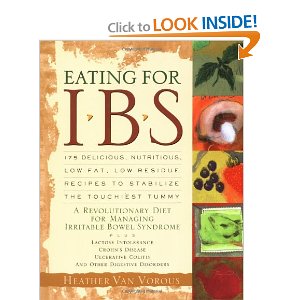 the idea that the days of old are gone for the IBSers. Gone are the boring, only eat at home, high fiber diets, and here are the exciting alternative recipes that allow for food enjoyment again.
the idea that the days of old are gone for the IBSers. Gone are the boring, only eat at home, high fiber diets, and here are the exciting alternative recipes that allow for food enjoyment again.
Thoughts
People with IBS suffer enough discomfort already, let alone having to eat food that has no taste or spice. This recipe book can add some vitality to the dietary life of the person seeking IBS treatment. With this inventive and original recipe book by Vorous, you can enjoy home cooked meals, deserts, and party foods. With the author’s help, the IBSer can get back a previously absent part of their life!
Answers: 1) d, 2) a, 3) a

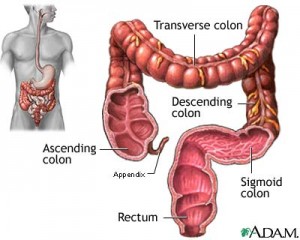

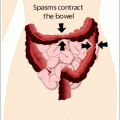
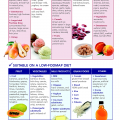

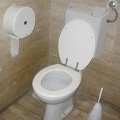

March 8, 2013 at 2:35 pm
I thought I’d post a thank you for all of the great information you provide, and for the product and literature recommendations you make to people suffering from IBS. My battle with Irritable Bowel Syndrome takes the same course every time: I find myself under stress and within an hour I feel the onset of IBS symptoms. I have tried a lot of home remedies, medications and treatments over the years, but never thought to treat the stress. Thanks for shining a light on what should have been obvious.
April 5, 2013 at 3:10 pm
Ken your frustration is exactly why we started this site. There are millions like you who suffer with conditions without much hope. If we can bring a new idea to you for feeling better, then we’ve had a good day. Thanks for sharing.